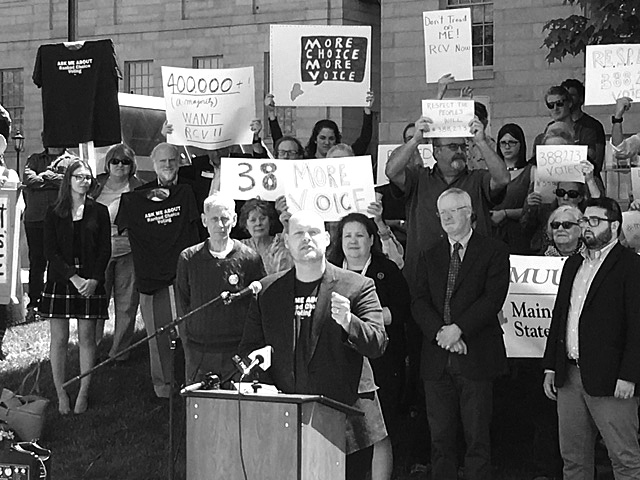In November 2016, 55% of Gorham voters joined other Mainers in approving a ballot question in support of Ranked Choice Voting (RCV). This May, however, the Maine Supreme Judicial Court issued an advisory opinion that the new law is unconstitutional in elections for governor and the State Legislature. This prompted state lawmakers to bring two bills to the Legislature.
One bill (LD1625) would repeal the new law in its entirety. The other bill (LD1624), submitted by RCV supporters, would amend the constitution to allow ranked- choice voting to be used in state general elections. Advocates of RCV are arguing for the constitutional amendment, but they also say it is not necessary for implementing ranked-choice voting in primary and federal elections in 2018, as there are no constitutional questions about using it in those races.
At a public hearing on June 3, Kyle Bailey, Gorham resident and lead spokesman for the RCV Committee, urged legislators not to repeal the bill, saying that support for the bill crosses party lines and represents the will of the people. Critics argue that voters would be confused by the two types of ballots, since the one for state offices would not ask voters to rank candidates and the other ballot would.

Kyle Bailey spoke at the Ranked Choice Voting Rally in Augusta on June 3.
The Maine Constitution requires that the governor and state legislators be elected by a plurality, which means that the candidate with the most votes wins. The winner does not need more than 50% of the votes cast, only more votes than his or her opponents. Ranked-choice voting requires candidates be elected by a majority and asks voters to rank them. If no one has more than 50% of votes cast, the one with the lowest number of votes is eliminated.
Voters who voted for the eliminated candidate would have their second-place choices added to total of the candidate they chose second. In a three-way race, that process would give one of the two remaining candidates a majority of more than 50% of the votes. If there were more than three candidates, the process would continue until someone had more than 50% of the votes.
This is the system Mainers voted for last November. They will use this process for primary elections and to elect members of Congress if the legislature votes to retain ranked-choice voting for the offices the Maine Constitution does not mandate be chosen by plurality. An amendment to the Constitution, which requires a two-thirds vote of the legislature and a majority of Maine voters in a referendum election, would permit RCV for state offices as well.


